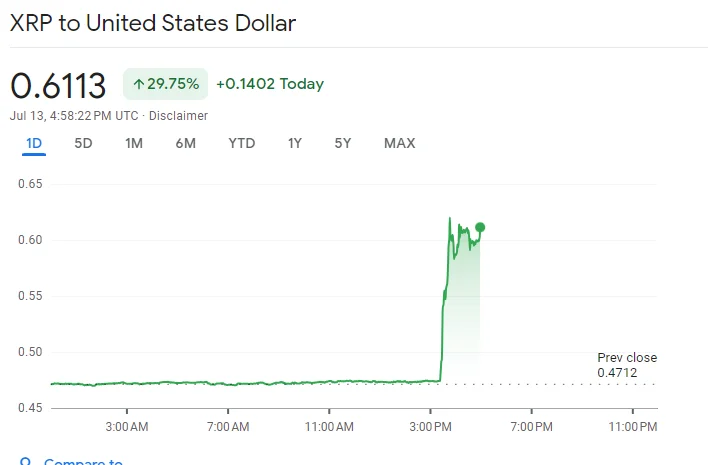In a recent development, a New York court has made a significant ruling in the ongoing case between Ripple Labs Inc. and the U.S. Securities and Exchange Commission (SEC). The court stated that the sale of XRP tokens by Ripple on exchanges and through algorithms does not qualify as investment contracts, but it did find that the institutional sale of the tokens violated federal securities laws.
U.S. District Judge Analisa Torres published the court’s conclusions in an order that partially granted a motion for summary judgment. The SEC had accused Ripple Labs and its executives, including CEO Brad Garlinghouse and co-founder Christian Larsen, of failing to register XRP as a security. While the court determined that the sale of XRP on exchanges does not meet the definition of investment contracts, it did rule that the institutional sales to hedge funds and other buyers constituted unregistered sales of securities.
Brad Garlinghouse, expressing his response to the court’s ruling, tweeted, “We said in Dec. 2020 that we were on the right side of the law, and will be on the right side of history. Thankful to everyone who helped us get to today’s decision – one that is for all crypto innovation in the U.S. More to come.”
We said in Dec 2020 that we were on the right side of the law, and will be on the right side of history. Thankful to everyone who helped us get to today’s decision – one that is for all crypto innovation in the US. More to come.
— Brad Garlinghouse (@bgarlinghouse) July 13, 2023
During writing this news Ripple CEO tweeted The most important part of this ruling: “XRP, as a digital token, is not in and of itself a “contract, transaction[,] or scheme” that embodies the Howey requirements of an investment contract.” This is now a matter of law (not up for trial.)
The most important part of this ruling:
“XRP, as a digital token, is not in and of itself a “contract, transaction[,] or scheme” that embodies the Howey requirements of an investment contract.”
This is a now a matter of law (not up for trial.)
— Brad Garlinghouse (@bgarlinghouse) July 13, 2023
This ruling provides some clarity regarding the regulatory status of XRP and its sale. It affirms that the tokens sold on exchanges and through algorithms are not subject to federal securities laws. However, it also emphasizes the need for companies to comply with securities regulations when engaging in institutional sales of digital assets.
While this decision represents a partial grant of summary judgment in Ripple’s favor, the case will proceed to trial for a jury to decide on other aspects of the SEC’s claims. The trial’s outcome holds potential implications for the cryptocurrency industry, as it could influence regulatory approaches and definitions for digital assets.
The SEC’s allegations against Ripple revolve around a $1.3 billion unregistered securities offering through the sale of XRP tokens, which were created by Ripple’s founders in 2012. The court’s ruling on institutional sales highlights Ripple’s potential need to address the allegations and potential consequences of violating federal securities laws.
This ruling marks a significant milestone in the ongoing legal battle between Ripple and the SEC. It underscores the intricate regulatory landscape surrounding cryptocurrencies and emphasizes the necessity for clearer guidelines to foster innovation while safeguarding investor interests. As the trial progresses, industry participants and observers will closely monitor the outcome and its potential impact on the wider crypto ecosystem.
1/5
Ripple case, here is the good and the bad.
But it is mostly *VERY* good for all alts, and a surprisingly big win for XRP.
First Judge did decide institutional sales/fundraising was securities. pic.twitter.com/esmjcIrzN0
— Adam Cochran (adamscochran.eth) (@adamscochran) July 13, 2023


